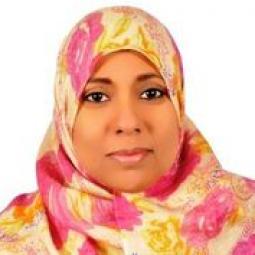Meet the Fellows: Salma Sylla Mbaye
July 30, 2018
Checking in with Senegal's soon-to-be first astrophysics PhD
Salma Sylla Mbaye, a 2017 OWSD Fellow from Senegal, is truly blazing new trails in science: when she receives her PhD in astrophysics, she will be the very first astrophysicist in her country. Currently completing a sandwich fellowship at the University of Cadi Ayyad in Morocco, Salma will return to her home institute at the University of Cheikh Anta Diop in Senegal to finalize her thesis, a comparative study of meteoritic impacts on Jupiter and the Moon. We asked Salma to tell us a little bit about her inspiration and how the fellowship is going so far.
 How did you learn about the OWSD fellowship? How would you say it has impacted your career?
How did you learn about the OWSD fellowship? How would you say it has impacted your career?
In 2010, eight years ago, I met an astrophysicist from Belgium, Katrien Kolenberg, at an international meeting organized in Dakar. We discussed my enthusiasm to do a PhD in astrophysics; however, in my home country, astrophysics is not yet taught at university, and it was not straightforward to find a way to pursue my dream. In 2017, we learned about OWSD's assistance to women in their scientific careers, and I applied for the PhD fellowship.
With OWSD, I am making my dreams come true. I can begin my science career by doing my PhD in astrophysics. I am very proud to be an OWSD Fellow. In addition to the funding, it also allows for networking, which is very fruitful.
What are you researching? What first made you interested in this subject?
My research is focused on our solar system, in particular on meteoroid impact flashes in Jupiter. This research will allow us to make a more precise estimate of the age of the outer Solar System.
Generally, I am very inspired by astrophysics. I decided to focus on this subject specifically because it will be a good way to introduce the field of astronomy in Senegal. My PhD will be the first astrophysics PhD obtained in Senegal, so it is important to me to do research on something that can attract the next generation.
Has anything surprised you about your research experience?
What has surprised me is that when I talk about my research, most people look at me like they’re lost, as if my field of research is unknown. Now I understand that if we do research, in addition to establishing connections with other researchers, we must also communicate and do a lot of outreach in order to share our science to the community.
What are your plans for the future? What will you do after you complete your PhD?
After my PhD, I plan to do many things. First, I would like to share my research in my country and to teach astronomy at the university. I would also like to establish connections with the international astrophysics community, and to help grow the emerging astronomy community in Senegal. Finally, I hope to work with the Office of Astronomy for Development (IAU-OAD) and the Africa Initiative for Planetary and Space Science (AFIPS) to do outreach in astronomy at schools in Senegal, and in our neighboring countries.
THANK YOU, SALMA!







































